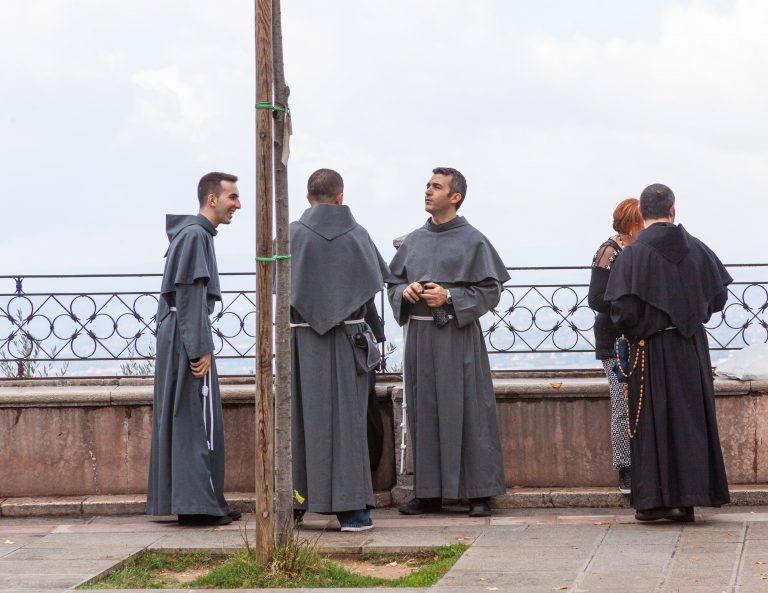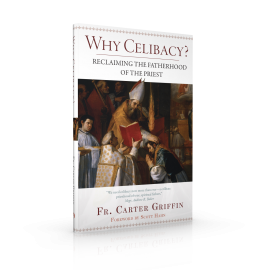By Fr. Carter Griffin
Fr. Carter Griffin is a priest of the Archdiocese of Washington. Since 2011 he has been engaged in the formation of seminarians at Saint John Paul II Seminary in Washington, DC. Fr. Griffin is a graduate of Princeton University and a former line officer in the United States Navy. He is the author of Why Celibacy?: Reclaiming the Fatherhood of the Priest.

As a Catholic, the question of celibacy is important to me. It is one of those Catholic “peculiarities”, like the Papacy and our colorful history and our challenging moral teachings, that provoke either the admiration or the contempt of the outside world.
As a priest, celibacy is important to me because it is the backdrop, even the framework, in which I live my daily life–much as a wife and children do for other men.
As a seminary rector, however, celibacy takes on a particularly decisive quality. It is in forming young men for the celibate priesthood where the magnitude and the beauty and the struggle of celibacy shows itself in starkest relief. I love my vocation and am very happy as a celibate priest, but I also remember that at first I was appalled by the notion of being celibate and realize that it can be a difficult journey at times. I am continually challenged to take my own celibacy seriously if I am going to propose it to the young men in formation.
A father encouraging his son to embrace the joys and the trials of marriage has the same experience. Marriage, like celibacy, has its share of difficulties. In recommending marriage, the father is asking his son to do a difficult thing, one that might involve suffering, but one that is noble and worthwhile. As one father once asked me, “What father could stand before his son and ask him to do something that is not good for them?”
Yet I’m afraid that that is precisely what many, even some faithful Catholics, believe: that celibacy is in fact “not good for them.” Requiring celibacy of priests, this thinking goes, means calling them to an impossible ideal. It is unthinkable to live a full life without sexual relations and without the emotional bonds of ordinary family life. Many see celibacy as unnatural and unscriptural, and at least partly responsible for the sexual abuse crisis in the Church today. Still others see it as promoting an unhealthy clerical culture that has allowed sexual abuse to flourish.
For reasons that I explore in Why Celibacy?: Reclaiming the Fatherhood of the Priest, I believe that every one of these statements is false. False–but also understandable. Many celibate priests, after all, clearly have been unfaithful to their promises, and with tragic consequences. We can, and must, do better in calling our priests to authentic fidelity and accountability.
It begins with a proper appraisal of celibacy itself. One of the reasons I wrote this book is to acknowledge the sacrifice that accompanies the charism. By foregoing natural fatherhood, a priest gives up a treasure of immeasurable worth. The other reason I wrote it, however, is to explore what is too often left unsaid: the extraordinary beauty and yes, the joy, of a celibate life well lived. The book has given me fresh confidence in my work as seminary rector as I ask spiritual sons to embrace something difficult that, when well lived, will be a source of joy and grace to the Church, to the world, and indeed to themselves.
In the past three months I have been gratified by many positive reactions to the book. Recently a seminarian told me that the book has “fired him up” to become a priest and a spiritual father–and now he wants to learn how to be a better son of our Father in heaven, since every man learns fatherhood by being a son. A younger priest told me that he now looks at his priesthood–and his people–differently, with a more robust understanding of his own spiritual paternity. An older priest told me that the book puts into words things that he has always believed and lived by, but never quite articulated. Perhaps the most unexpected responses have come from natural fathers who tell me that the book has given new insights into their own fatherhood–and revealed an entirely new dimension of spiritual fatherhood: their own.
Speaking for myself, however, I must say that the book has had a more personal effect. It has given me the chance to speak to many priests about their own experience of celibacy, and I am more convinced than ever that it is a powerful force for good in the world. The renewal of the celibate priesthood, in reclaiming its true ordering to spiritual fatherhood, will allow its impact to flourish once again. It has helped me continue to stand before seminarians and, with ever-deeper conviction, encourage them to embrace their tremendous vocation to celibate priestly paternity.
It is true: celibacy is one of the peculiarities of our faith, in the full sense of the word. It is a paradox. The highest manifestation of human paternity, in the order of grace, is lived by men who are not even married. I pray that this book may help renew our confidence that this beautiful charism which is given to priests, to the Church, and indeed to the whole world, is a source of abundant life.
You Might Also Like

Priestly celibacy, some say, is an outdated relic from another age. Others see it as a lonely way of life.
But as Fr. Carter Griffin argues in Why Celibacy?: Reclaiming the Fatherhood of the Priest, the ancient practice of celibacy, when lived well, helps a priest exercise his spiritual fatherhood joyfully and fruitfully.